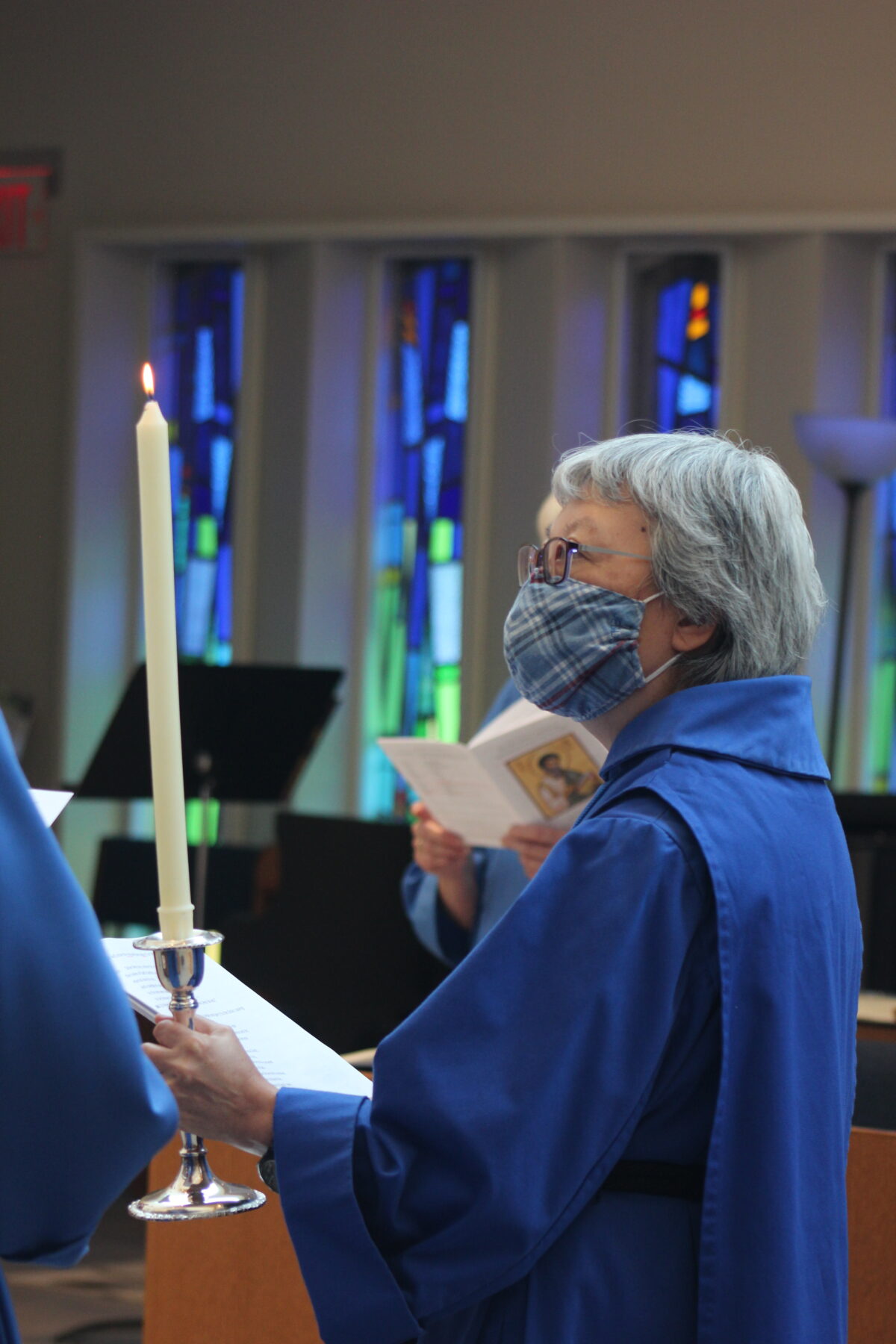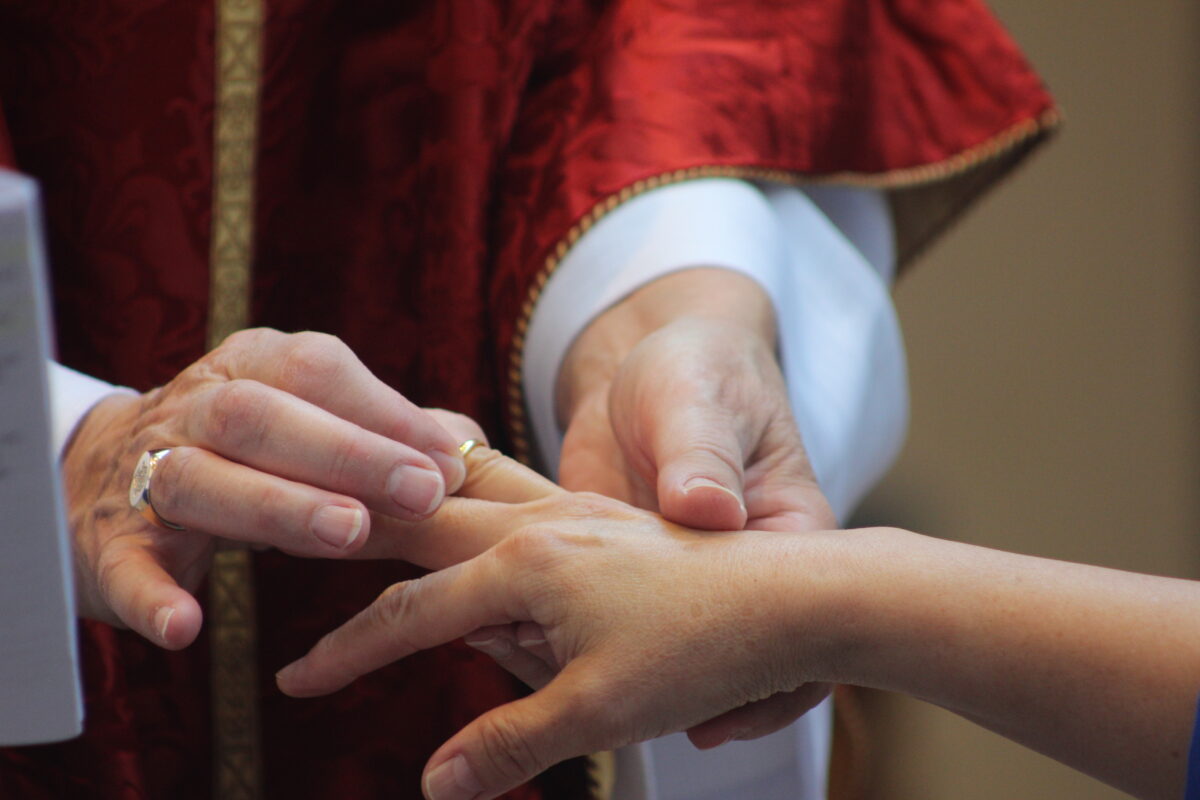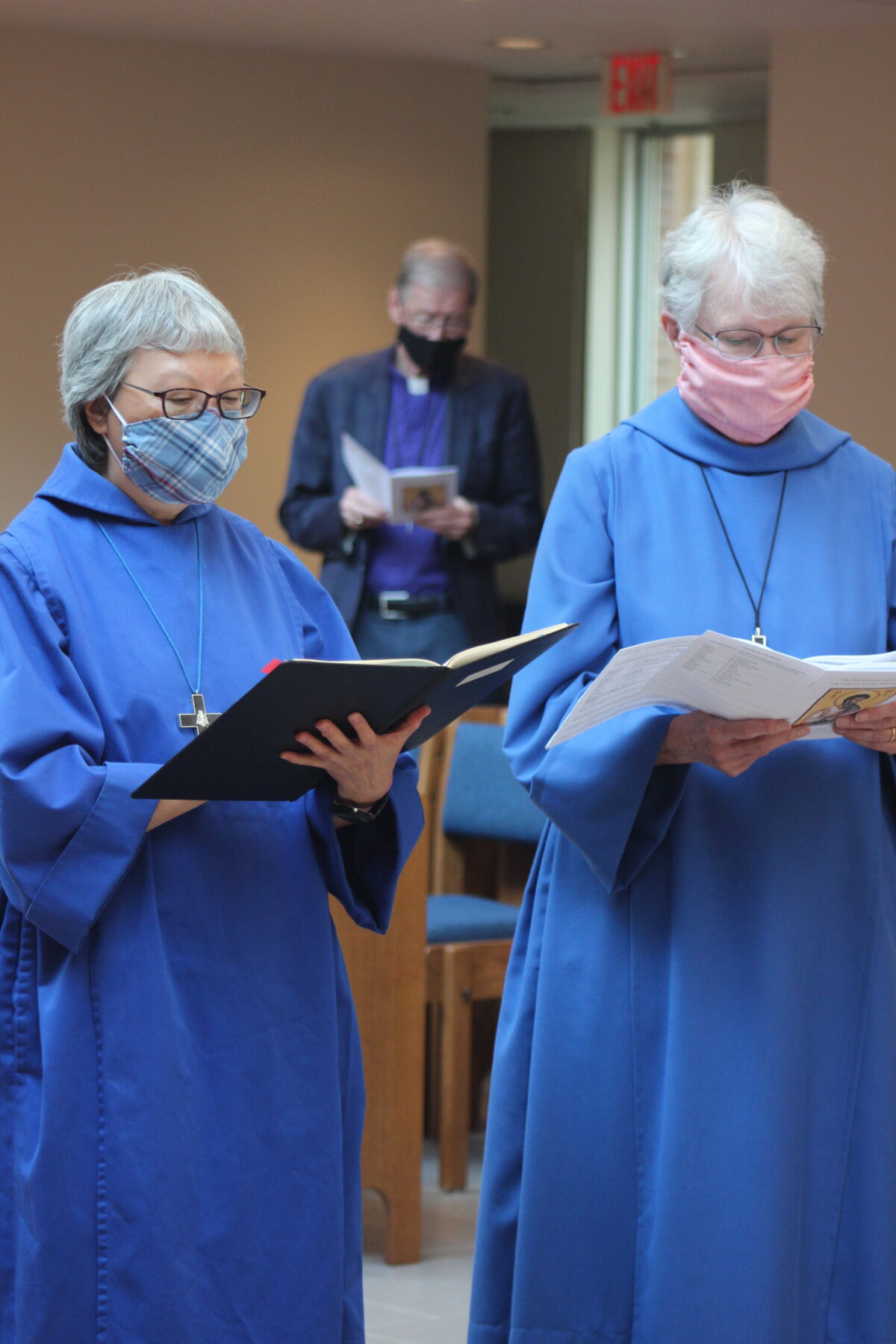The Homily for the Life Profession of Sister Amy Joy
St. John’s Convent, Feast of St. Matthew, September 22, 2020
By Sr. Constance Joanna, SSJD
Proverbs 3.1-6 Matthew 9.9-13 Psalm 119 part 5
Take my life, and let it be consecrated, God, to thee.
Keep my life, that I may be ever, only, all for thee.
The author of those lines is Frances Ridley Havergal, an English woman who was an almost exact contemporary of Mother Hannah but sadly died prematurely in her early 40s, just as Mother Hannah was being recruited to found this Sisterhood.
Despite her short life, Frances was something of a hero among Anglican women in the 19th century. Like Mother Hannah, she was the daughter of an Anglican priest who felt it was important to educate women, and she herself was a highly educated woman who travelled abroad and was proficient in a number of modern languages as well as Greek and Latin.
I like to think that Mother Hannah, and probably Hannah’s father, would have known of Frances. She was highly regarded in Anglican circles in Ontario and best known here for two things. First, she was a patron of women’s education at a time when very little thought was put into into teaching women beyond giving them the basics they needed to be good wives and mothers according to the cultural norms of the time. In recognition of her support of a strong academic grounding for women, Havergal College (which was founded after her death) was named after her.
She was also a composer, hymn-writer, author and humanitarian. Her best-loved hymn is “Take My Life and Let It Be” which we will sing today at the Offertory. As the first hymn that Amy Joy sings after making her life vows, it will bring to a close an important stage of her life over the past eight years and mark the beginning of a new journey as a life-professed sister.
I have had the joy of travelling alongside Amy Joy during those eight years. She first came on Women at a Crossroads in 2012 and then became a Alongsider that fall. She has always maintained a close friendship with Lydia Leung, who was a Crossroader with her, and with her fellow Alongsider that year, Joyce Lambert. She stayed a second year as an Alongsider and then, in 2014, became a Postulant.
Eight years is a long time to give of your life to something that is not part of your tradition or culture, and so this Baptist pastor from Hong Kong persevered in God’s call and has become a beloved sister in the Sisterhood of St. John the Divine, reflecting the strong commitment that Amy Joy has to her Christian faith and to the path that God calls her on.
There have been many sacrifices along the way, and Amy Joy does not make decisions without a lot of thoughtful prayer. She needs to be sure that what she is giving herself to for the rest of her life is God’s will and not her own.
And that reminds me so much of Frances Ridley Havergal. Another connection between them is the joy that they both manifest in their vocations – a characteristic also shared with Mother Hannah. The Christian life is a life of overflowing joy in knowing the God who loves us without condition and who enables us to live the most abundant life possible. So I think it’s appropriate that Amy Joy’s Life Profession is on the Feast of St. Matthew, who as far as we can tell from the way he wrote his gospel was a person who had a huge burden removed from his own life and became an ardent follower of Jesus.
The passage chosen to mark Matthew’s feast day is especially relevant. When Jesus’ critics accuse him of eating with tax collectors and sinners, Jesus says that his vocation – his reason for being – is to call not the healthy but those who are sick. It is the weak and the sinful and the vulnerable who most need the message of God’s unconditional love and who are open to hear it. And because we are all weak and sinful and vulnerable by turns, it’s good to have sisters who remind us of God’s love at those times by their concern and support of us.
As with Matthew, the gospel is embedded in Amy Joy’s life, and I treasure a particular time when she was Volunteer Coordinator. During our Volunteer Recognition Dinner that year, she told a gospel parable in the form of Biblical storytelling – with wonder, awe, and especially joy in conveying Jesus’ love to others. The volunteers (as well as the rest of us) were left with no doubt about how they were valued by the Sisterhood as well as by God.
Amy Joy, like Matthew and the other disciples, is also an inquisitive learner. She loves to ask questions of God, of Jesus and Holy Spirit, as well as of us. she loves to learn and to try new things – crab fishing in Victoria is just one recent example.
That love of learning and getting to know people is at the heart of her appreciative and grateful nature. I’ll always remember how she and Joyce Lambert and I came to know each other more deeply. In the fall of 2012 they were both enrolled in a course I was teaching at Wycliffe, and every Wednesday night the three of us would drive down to the campus early and set up camp, as it were, in the Cody Library where my class was held. We would bring our picnic suppers and sit around a library table and talk about our lives – and about life in general – an hour before any other students started to arrive. A strong three-way friendship developed there, and Amy Joy and Joyce will remain friends forever, I’m sure. That experience enriched my own life immeasurably.
But of all the things I have admired and been moved by in Amy Joy’s journey is her passionate, joyful love of God and her sharing of God’s unconditional love with others. Frances Ridley Havergal must have been a lot like that, I think. I want to share with you something Frances wrote – a small book that is a commentary on her own hymn “Take my Life and Let it Be” – not unlike the way John of the Cross’s The Dark Night of the Soul is a commentary on his famous poem.
The title of Frances’ book is Kept for the Master’s Use and the word “kept” is key. She describes the Christian journey as a continual giving over ourselves to God. We may sing “Take my life and let it be consecrated Lord to thee” with passion and conviction when we first become Christians, but we make that commitment over and over again at various stages of out live – which is why it’s the perfect hymn for Amy Joy’s Profession. And in between those times of great commitment, we need to pray not so much “take my life” as “keep my life.” The chapters of the book reflect that conviction: “Our Lives Kept for Jesus,” “Our Moments Kept for Jesus,” “Our Hands Kept for Jesus,” and so on. She rewrites the poem substituting the word “Keep” for “Take” and then she says:
Yes! Jesus who is able and willing to take unto Himself is no less able and willing to keep for Himself. Our willing offering has been made by His enabling grace, and this our King has seen with joy.
And that joy is the result of our awareness of God’s love for us. In the final chapter, she takes a further step. We offer ourselves to God many times in our lives, and many times we pray that God will keep that offering. But it’s all possible – our offering – because Jesus offers himself for us – his hands, his feet, his voice, his love and his life above all. These rapturous words come near the end of the book, and they convey a feeling that I see in Amy Joy’s relationship with Jesus:
His love! What manner of love is it? What should be quoted to prove or describe it? First, the whole Bible with its mysteries and marvels of redemption, then the whole world of creation. Then add to these the unknown records of eternity past and the unknown glories of eternity to come. Then let those immeasurable words be sung by angels and archangels, and all the company of heaven, with all the harps of God, and still that love will be untold, still it will be the love of Christ that passeth knowledge. But is for thee!”
God bless you, Amy Joy, and may we your sisters be worthy of your dedication.
Take our lives, and let them be consecrated, God, to thee.
Keep our lives, that we, and this Sisterhood, may be ever, only, all for thee.





